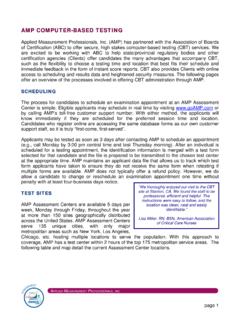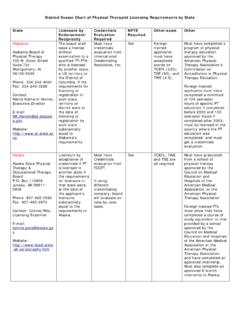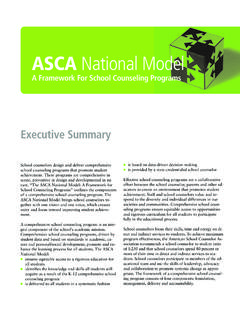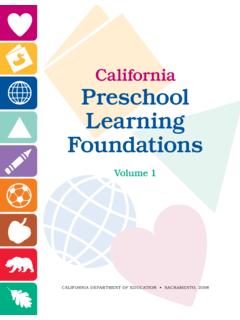Transcription of HIPAA Facts: Parent and Minor Rights Provided by the ...
1 HIPAA Facts: Parent and Minor Rights Provided by the Technical Assistance Support Center of the national association for Rights Protection & Advocacy Q&A by Susan Stefan, Center for Public Representation What right does a Minor have under HIPAA to claim his or her own privilege to deny access to records under HIPAA ? If the Minor does not want parents or others to have access to his or her records, can the provider refuse to provide the records to the parents ? The short answer to this question is that if the health care provider or facility concurs with the Minor that the parents should not have access to his or her treatment records, the Minor has a good chance of precluding parents from access to the records or granting access to others.
2 However, if the facility or provider does not concur, the Minor s chances of precluding such access are minimal. This is the short answer; the route to this answer is longer and more circuitous. I. The Language of the Regulations The Rights of parents to authorize access to their children s protected health information are covered in the section of HIPAA regulations governing the Rights of personal representatives, 45 (g). A personal representative is a person authorized under applicable law (presumably state law) to make health care decisions on an individual s behalf.
3 (Thus, an attorney is not ordinarily a personal representative under HIPAA ). In general, a covered entity must accord a personal representative the same Rights as would be accorded the individual with regard to access to records, 45 (g)(2). In most cases parents (or guardians or those acting in loco parentis) will be considered personal representatives of a Minor or unemancipated child, and therefore, in most cases, parents can exercise the right of access to the medical record on the child s behalf. 45 (g)(3). However, there are a number of exceptions to this general rule, which may be particularly applicable in the mental health setting, depending on your state s law.
4 A. Minor s Right to Seek Independent Treatment First, the regulations permit the Minor to exercise control over his or her own records if, under applicable state law, he or she did obtain or could obtain the health care for which the records are being sought without the requirement of parental consent, and if the Minor did not ask for the Parent to be treated as a personal representative, 45 502(g)(3)(i). Thus, if state law permits a Minor to seek mental health treatment without parental authority, the Minor can exclude parents from seeing his or her records and from authorizing access to the Minor s records.
5 This is true even if the parents have consented to the treatment. If the Minor could have legally received the treatment solely on the basis of his or her consent, the fact that the parents did consent to the treatment does not necessarily entitle them to see or authorize access to the records, In good legal fashion, there is an exception to this exception. If explicit state law (including case law) permits or precludes disclosure of protected health information about a Minor to a Parent , guardian or other person acting in loco parentis, then HIPAA defers to the state law, 45 (g)(3)(ii)(A) and (B).
6 However, it is also true that if state law explicitly prohibits parental access, HIPAA will not be interpreted to thwart this protection of the child s privacy, id. B. Professional Judgment that parents Should Not be Allowed Access to the Records If there is no applicable state law about the Rights of parents to the protected health information of their children, then HIPAA regulations permit the covered entity (the doctor or health care facility) to provide or deny access to the records, as long as the decision is made by a licensed health care professional, in the exercise of professional judgment.
7 45 (g)(3)(ii)(C). C. Parental Abuse, Neglect, or Endangerment Regardless of the applicable state law, if the covered entity has a reasonable belief that the personal representative may be abusing or neglecting the individual, or subjecting him or her to domestic violence; or that treating the Parent as the personal representative could endanger the individual, or (most broadly of all) if the covered entity in the exercise of professional judgment decides that it is not in the best interest of the individual to treat the person as the individual s personal representative, the provider may refuse to provide the records, 45 502(g)(5).
8 II. Interpretive Guidelines This section of the HIPAA regulations was one of the ones that was most substantially altered by the Bush administration s reconsideration of the Clinton administration HIPAA regulations. The changes made by the Bush administration were explicitly intended to strengthen parents Rights , states Rights , and professional Rights , see Comments, 67 Fed. Reg. No. 157, 53199 (August 14, 2002). In making the amendments, the Department noted that there were three goals with respect to the parents and minors provisions of the Privacy Rule.
9 First, the rule seeks to balance parents Rights to access to health information about their children in order to make important health care decisions about them with the minors ability to consent to and obtain health care under State and applicable law. Id. at 53200. Second, the provisions attempt to not interfere with State or other applicable laws related to parental Rights . Third., the Department does not want to interfere with the professional requirements of State medical boards or other ethical codes of health care providers with respect to confidentiality of health information or with the health care practices of such providers with respect to adolescent health care.
10 Id. Of course, these goals are not necessarily always congruent. For example, the changes to assure that parents have appropriate access to health information about their children, were generally opposed by health care providers, who were concerned that the changes would decrease the willingness of adolescents to obtain necessary health care for sensitive types of health care services. The Bush administration felt that the appropriate balancing for these concerns would be accomplished by leaving as much as possible to be determined by state law in this area.







